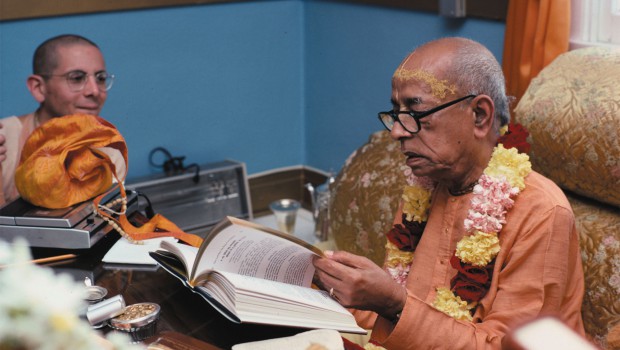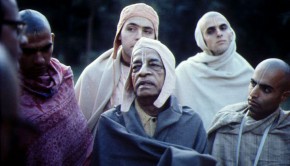Srila Prabhupada’s books Should Not be changed!
Post-disappearance editorial revisions by conditioned souls to the sacred, memorialized realizations of an exalted Acarya are nothing less than crude, insulting and offensive. Yet, this is precisely what has taken place for two decades and continues to take place by those who, ironically, have a special spiritual duty to preserve Srila Prabhupada’s literary legacy at all cost.
Hare Krishna Govinda devi. All glories to Srila Prabhupada.
Yes, I certainly share your deep concern over the ongoing editorial changes being made to Srila Prabhupada’s literary legacy. And here is the gist of it: while an author might, during his or her lifetime, re-edit and then re-print a previously published book, we would be hard pressed to find anyone, anywhere, who would entertain the idea that, once published, an author’s work may later be edited posthumously and then presented anew in a ‘revised and enlarged edition’ as if it were the author’s original work!
And, for those who have any sensitivity or knowledge of spiritual etiquette regarding the proper post-disappearance handling of an Acarya’s sacred adi-vani, or original spiritual instructions, such a disturbing editorial scenario is wholly unacceptable.
In the Western tradition, the posthumous bastardization process is referred to as “bowdlerizing” a work (named after an English editor, Thomas Bowdler, famously involved in an editorial scandal involving an expurgated edition of Shakespeare). In the Eastern tradition the principle of not changing an Acarya’s work post-disappearance is enshrined in the sastric principle referred to as arsa-prayoga. Clearly, post-disappearance editorial changes to an Acarya’s transcendental literary work is not done and should not be done. Sastric authority on this point abounds.
What really strikes me is how unfortunate it is that there is need for this discussion at all. Indeed, it should not have to be pointed out that post-disappearance editorial revisions by conditioned jivas to the sacred, memorialized realizations of an exalted Acarya is nothing less than crude, insulting and offensive. Yet, this is precisely what has taken place for two decades and continues to take place by those who, ironically, have a special spiritual duty to preserve Srila Prabhupada’s literary legacy at all cost. Certainly those entrusted with the fiduciary duty of preserving Srila Prabhupada’s adi-vani, or original spiritual teachings, should know this.
As regards the rationale and reasons cited for making post disappearance changes to Srila Prabhupada’s adi-vani, His original instructions, those flimsy arguments completely miss the mark.
A threshold argument made is that continuing changes are authorized merely because certain editors were permitted, during Srila Prabhupada’s manifest presence, to make editorial adjustments to punctuation, spelling and grammar, and because, at that time, Srila Prabhupada expressed a certain degree of confidence in their editorial ability.
That pre-1978 service engagement was not a blank cheque, however, to continue the editorial process unabated for all time. Just as you never ask a barber if you need a haircut, you cannot reasonably expect an editor to make an objective decision whether or not to continue editing a book! There is no written authority whatsoever that Srila Prabhupada expected or wanted the editorial process to continue post disappearance on books that he already approved and that were already published. In fact, the unequivocal evidence is inapposite — Srila Prabhupada did not want his books continuously changed and edited after they were published.
It is one thing for an understudy (an apprentice) to contribute to a Master’s work, be it artistic or literary, during that Master’s lifetime and under the Master’s supervision and approval. However, once a Master signs off on a work (that is, approves the work as finished), it is unheard of in either the Western or the Eastern tradition that the apprentice would then take the liberty sua sponte to change the painting or book and publish it posthumously AS IF that painting or book had been approved by the Master during his lifetime! Using such logic, a one percent per year change to the enigmatic Mona Lisa could wind up being, in a short hundred years, a picture of MAD Magazine’s demented Alfred E. Newman!
Moreover, we should not overlook the fact that Srila Prabhupada personally lectured on most every verse in the 1972 Bhagavad-Gita As It Is, other than perhaps the first chapter, and as far as I am aware, He only asked that three words be changed. If those pre-1978 books were good enough for the author and Founder/Acarya, they should certainly be good enough for us! If those books were considered transcendental by the author and by the entire movement then, why should we not continue using those books now?
And, if Srila Prabhupada had authorized continuing editorial changes, as is being intimated, then why is it that permission from the GBC was sought in 1983 for the ‘revised’ edition? The reason, of course, is that such post disappearance changes were never authorized by Srila Prabhupada and therefore institutional approval was sought by the editors. By the way, the GBC agreed to allow the changed book in 1983 by only one vote — not exactly a landslide.
The main argument being asserted for changing the books is as deceptive as it is subtle. The argument is that changes made to the 1983 edition of the Bhagavad-Gita As It Is brings the book closer to the manuscript (or galley proofs) than was the original 1972 edition. As noted above, however, this argument completely fails to take into account the absolute prohibition, in both the Western and Eastern tradition, against posthumous and post disappearance changes, respectively.
It is critical to understand that the issue is NOT whether the manuscript is closer to the first or second edition (or perhaps in fifty years closer to the tenth edition). If that were the issue we could then expect who knows how many more editors making who knows how many more changes to Srila Prabhupada’s books under the guise that their editorial changes were, in fact, closer to what Srila Prabhupada really meant or really said. A misguided publishing policy which approves post disappearance changes to Srila Prabhupada’s works will only result in an unending series of changed books for many more years to come. Is that what Srila Prabhupada wanted? Certainly not!
Instead, the actual issue at hand is that once an author has personally approved his work and it is published, it cannot be changed posthumously or post-disappearance by a non author and then presented AS IF it were the actual author’s originally approved work. Doing so runs directly afoul of both Western and Eastern traditions.
Srila Prabhupada’s literary legacy must be preserved, frozen in time so to speak, for posterity. Continuing changes over the upcoming decades and even centuries will only serve to incrementally denigrate the potency of His gift. The world wants and needs to hear Srila Prabhupada’s transcendental voice As It Is — not the prissy sterility of an editorial cottage industry run amok. Certainly, if the authorized and approved pre-1978 books were good enough for Srila Prabhupada during his manifest presence, they should be good enough for everyone right now!
About the only way out of this editorial and publishing morass is to firmly re-establish the 1972 edition of the Bhagavad-Gita As It Is which was approved and authorized by its author, His Divine Grace, as the literary standard, and then, some time later, to publish the original manuscript so that scholars and spiritually-minded persons can study and comment as they see fit. The editors are free, of course, to print their own books and to make a record as they want, but not under the guise that the original author approved their particular post disappearance word craft.
On the other hand, to continue along the “I know better what Srila Prabhupada really meant” route by allowing post disappearance editorial changes to Srila Prabhupada’s authorized and approved pre-1978 editions can only be seen for what it is — an ongoing, blatant violation of the sastric principle of arsa-prayoga.
At bottom, it is Srila Prabhupada’s transcendental vision the world wants and needs — not the conditioned viewpoint of some editor’s temporal sense of grammar or correctness that we seek.
With regards,
Gupta das
Joseph Fedorowsky
Some quotes:
Yasodanandan: Sometimes they appeal that “We can make better English,” so they change like that, just like in the case of Isopanisad. There are over a hundred changes. So where is the need? Your words are sufficient. The potency is there. When they change, it is something else.
Svarupa Damodara: That’s actually a very dangerous mentality.
Yasodanandan: What is it going to be in five years? It’s going to be a different book.
Srila Prabhupada: So you… What you are going… It is very serious situation. You write one letter that “Why you have made so many changes?” And whom to write? Who will care? All rascals are there. Write to Satsvarupa that “This is the position. They are doing anything and everything at their whim.
” The next printing should be again to the original way. (Srila Prabhupada conversation, June 22, 1977, Vrindaban)
Srila Prabhupada: … So you bring this to Satsvarupada. They cannot change anything. (Srila Prabhupada conversation, June 22, 1977, Vrindaban)
“It is not possible for a common man to write books on bhakti, for his writings will not be effective. He may be a very great scholar and expert in presenting literature in flowery language, but this is not at all helpful in understanding transcendental literature. Even if transcendental literature is written in faulty language, it is acceptable if it is written by a devotee, whereas so- called transcendental literature written by a mundane scholar, even if it is a very highly polished literary presentation, cannot be accepted . The secret in a devotee’s writing is that when he writes about the pastimes of the Lord, the Lord helps him; he does not write himself. As stated in the Bhagavad-gita, dadaami buddhi-yogam tam yena maam upayaanti te. Since a devotee writes in service to the Lord, the Lord from within gives him so much intelligence that he sits down near the Lord and goes on writing books. Chaitanya Charitamrita Adi 8.19
“So unless one is self-realized, there is practically no use writing about Krsna. This transcendental writing does not depend on material education.
It depends on the spiritual realization. You’ll find, therefore, in the comments of Bhagavatam by different acaryas, even there are some discrepancies, they are accepted as asat-patha. It should remain as it is.” (Srimad-Bhagavatam 7.5.23-24, March 31, 1976, Vrindaban)















Hello I need the original version of Bhagavad Gita
Get it from KrishnaStore.com:
https://krishnastore.com/books-bhagavad-gita-om-21_29.html
Well done.
Hare Krishna !
My full respect to Prabhu Madhuvidsa Dasa for write this article. My apologize to comment on 2 years old article, but I want and need to ask several things, Prabhu.
#1. Why do they change Prabhupada’s works? What’s their goals? Money?
#2. I’m still confused about Arjuna in Bhagavad Gita, Why is there no Arjuna’s name on any parampara ? Is there any explanation Prabhu ? I already try to find explanatiom from ISKCOM, but I’m afraud that it is conditioned for their motives.
I hope for your guidance, Prabhu.
Sincerely, lowest Krishna devotee of all times.
Hare Krishna
I have no idea why ISKCON are chanting Prabhupada’s books, that is a question you would have to ask them. I know that this was Prabhupada’s greatest fear, that his disciples would change his books after he disappeared, and they are doing it. So it is the worst possible thing they could do, the greatest disservice to Srila Prabhupada.
As far as the list of the disciplic succession in Bhagavad-gita it is not a complete list. It is just one line. There are thousands and thousands of devotees in the disciplic succession. This is just one example.
Hare Krishna,
Are all of the Sri Prabhupada books that are sold on krishnastore.com the original pre 1977 versions?
Hare Krishna
Yes. There are a few that are published after 1977, but all are original edition.
Haribol, can any one please confirm if the set of books available from Bhaktivedanta Manor is the original books or not….
From Bhaktivedanta Manor website it says:
Srimad Bhagavatam Pocket Edition Cantos 1-10 (30 Volume Set) This edition is a 2004 reprint of the 1972 Hamsaduta pocket edition
Yes. The BBT 30 volume compact Bhagavatam set is pre-1977. Means it is photographically reproduced from Bhagavatam volumes printed before 1977. It is not the first editon. But the editing was done under the orders of Srila Prabhupada. And I have checked a lot of the editing and whatever I have checked appears to be reasonable correction of typographical errors, grammar, etc. It is not like the post-1977 editing we have seen where the BBT change things. \
So different devotees may have different opinions but my opinion is that this 30 volume compact SB set printed by the BBT is completely authorized. There is no problem with it at all.
Chant Hare Krishna and be happy!
Madhudvisa dasa
Hare Krishna,
Are all of the Srila Prabhupada’s books on krishnastore.com copies of the original version?
Hare Krishna
yes
Dear Madhudvisa dasa:
All glories to Srila Prabhupada
First let me congratulate you for your courageous preaching in preservation of literary legacy of our beloved spiritual master Srila Prabhupada; on the other hand, do not remember where, but I read that there are 4 Prabhupada’s books that cannot fail to be read (of course it should be authentic and original books of Prabhupada, as you preach and defend admirably), of which two are the Bhagavad-Gita and Srimad Bhagavatam, for what you ask in the most attentive way, remember me what are those 4 books and the order they should be read (I think the Bhagavad-Gita is the first).
Your unworthy servant
Padma Carana Dasa
Hare Krisha Padma Charana Prabhu
Yes. There is a “four books” quote from Srila Prabhupada. But of course as disciples of Srila Prabhupada we can’t get enough of Srila Prabhupada and Krishna so there is no question of reading only four of Srila Prabhupada’s books. Obviously we have to, and we want to, we enjoy, reading ALL of Srila Prabhupada’s books over and over and over again. That is our bliss, that is our transcendental ecstasy.
So just read all of Srila Prabhupada’s books and when you are finished start to read them all again. That is the way…
I think the four books were Bhagavad-gita As It Is, Teachings of Lord Caitanya [Sri Caitanya-caritamrta], Nectar of Devotion and Srimad-Bhagavatam.
Chant Hare Krishna and be happy!
Madhudvisa dasa
Of course, admired Madhudvisa Dasa, the 4 books indispensable, are just to start, now the most important goal of my life is reading more than 80 books that Srila Prabhupada did not leave you with much effort and love of the spiritual master who knows that must be absent from our physical presence; all these books I hope to read, if Sri Krishna and Srila Prabhupada allow me (I’m almost 60 years old) will be the original and in English (my native language is Spanish language , but I’m learning English, at least read it), as are your recommendations. The transcendental taste is so sweet to read that is perceived the contact and association of a pure devotee, even though it is no longer physically present in this world.
All glories to Srila Prabhupada
All glories to all the devotees of Krishna
All glories to Sri Krishna
With all my gratitude, your humble servant in Krishna Consciousness.
Padma Carana Dasa
How can i know the original Bhagavad-gita without changed?
It looks like this:
http://krishnastore.com/bhagavad-gita-as-it-is-with-bonus-dvd-h-krishna-407.html
and you can get it from krishnastore.com